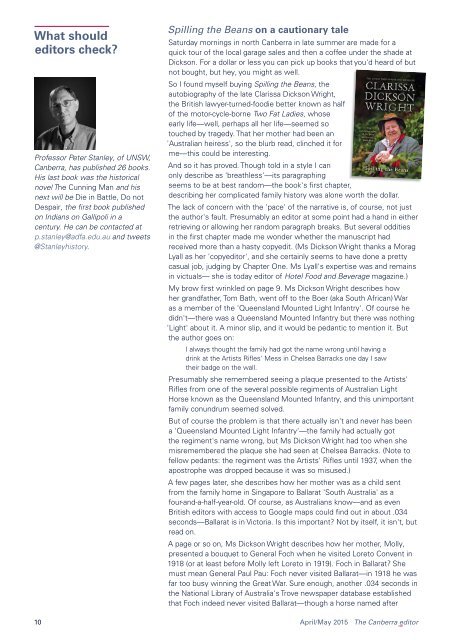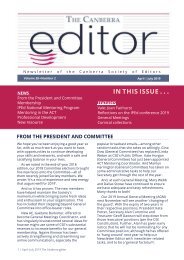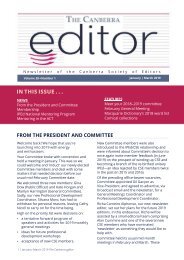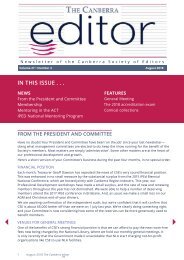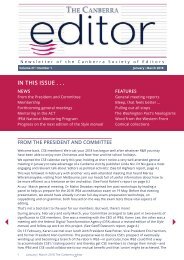The Canberra editor April-May 2015
Newsletter of the Canberra Society of Editors
Newsletter of the Canberra Society of Editors
Create successful ePaper yourself
Turn your PDF publications into a flip-book with our unique Google optimized e-Paper software.
What should<br />
<strong>editor</strong>s check?<br />
Professor Peter Stanley, of UNSW,<br />
<strong>Canberra</strong>, has published 26 books.<br />
His last book was the historical<br />
novel <strong>The</strong> Cunning Man and his<br />
next will be Die in Battle, Do not<br />
Despair, the first book published<br />
on Indians on Gallipoli in a<br />
century. He can be contacted at<br />
p.stanley@adfa.edu.au and tweets<br />
@Stanleyhistory.<br />
Spilling the Beans on a cautionary tale<br />
Saturday mornings in north <strong>Canberra</strong> in late summer are made for a<br />
quick tour of the local garage sales and then a coffee under the shade at<br />
Dickson. For a dollar or less you can pick up books that you'd heard of but<br />
not bought, but hey, you might as well.<br />
So I found myself buying Spilling the Beans, the<br />
autobiography of the late Clarissa Dickson Wright,<br />
the British lawyer-turned-foodie better known as half<br />
of the motor-cycle-borne Two Fat Ladies, whose<br />
early life—well, perhaps all her life—seemed so<br />
touched by tragedy. That her mother had been an<br />
'Australian heiress', so the blurb read, clinched it for<br />
me—this could be interesting.<br />
And so it has proved. Though told in a style I can<br />
only describe as 'breathless'—its paragraphing<br />
seems to be at best random—the book's first chapter,<br />
describing her complicated family history was alone worth the dollar.<br />
<strong>The</strong> lack of concern with the 'pace' of the narrative is, of course, not just<br />
the author's fault. Presumably an <strong>editor</strong> at some point had a hand in either<br />
retrieving or allowing her random paragraph breaks. But several oddities<br />
in the first chapter made me wonder whether the manuscript had<br />
received more than a hasty copyedit. (Ms Dickson Wright thanks a Morag<br />
Lyall as her 'copy<strong>editor</strong>', and she certainly seems to have done a pretty<br />
casual job, judging by Chapter One. Ms Lyall's expertise was and remains<br />
in victuals— she is today <strong>editor</strong> of Hotel Food and Beverage magazine.)<br />
My brow first wrinkled on page 9. Ms Dickson Wright describes how<br />
her grandfather, Tom Bath, went off to the Boer (aka South African) War<br />
as a member of the 'Queensland Mounted Light Infantry'. Of course he<br />
didn't—there was a Queensland Mounted Infantry but there was nothing<br />
'Light' about it. A minor slip, and it would be pedantic to mention it. But<br />
the author goes on:<br />
I always thought the family had got the name wrong until having a<br />
drink at the Artists Rifles' Mess in Chelsea Barracks one day I saw<br />
their badge on the wall.<br />
Presumably she remembered seeing a plaque presented to the Artists'<br />
Rifles from one of the several possible regiments of Australian Light<br />
Horse known as the Queensland Mounted Infantry, and this unimportant<br />
family conundrum seemed solved.<br />
But of course the problem is that there actually isn't and never has been<br />
a 'Queensland Mounted Light Infantry'—the family had actually got<br />
the regiment's name wrong, but Ms Dickson Wright had too when she<br />
misremembered the plaque she had seen at Chelsea Barracks. (Note to<br />
fellow pedants: the regiment was the Artists' Rifles until 1937, when the<br />
apostrophe was dropped because it was so misused.)<br />
A few pages later, she describes how her mother was as a child sent<br />
from the family home in Singapore to Ballarat 'South Australia' as a<br />
four-and-a-half-year-old. Of course, as Australians know—and as even<br />
British <strong>editor</strong>s with access to Google maps could find out in about .034<br />
seconds—Ballarat is in Victoria. Is this important? Not by itself, it isn't, but<br />
read on.<br />
A page or so on, Ms Dickson Wright describes how her mother, Molly,<br />
presented a bouquet to General Foch when he visited Loreto Convent in<br />
1918 (or at least before Molly left Loreto in 1919). Foch in Ballarat? She<br />
must mean General Paul Pau: Foch never visited Ballarat—in 1918 he was<br />
far too busy winning the Great War. Sure enough, another .034 seconds in<br />
the National Library of Australia's Trove newspaper database established<br />
that Foch indeed never visited Ballarat—though a horse named after<br />
10 <strong>April</strong>/<strong>May</strong> <strong>2015</strong> <strong>The</strong> <strong>Canberra</strong> <strong>editor</strong>


